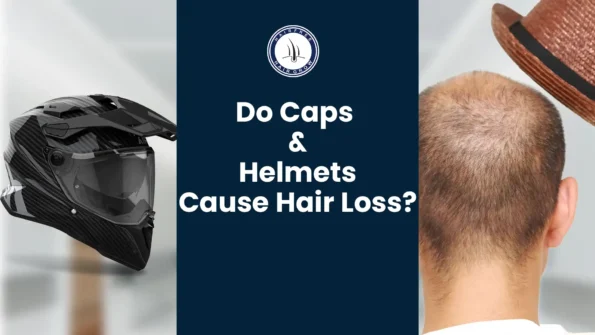Wearing caps or helmets is often considered a potential reason for hair loss. However, this topic has many misconceptions that need clarification. This blog will explore whether wearing caps or helmets can actually cause hair loss and what you can do to prevent potential hair-related problems. Do caps and helmets cause hair loss? They don’t directly, but tight or sweaty headgear can weaken hair over time.
Can Wearing Helmets or Caps Cause Hair Loss?
The short answer is no—wearing helmets or caps doesn’t directly lead to hair loss. Hair loss occurs due to several reasons, such as genetics, hormonal imbalances, stress, poor diet, or medical conditions like alopecia. However, if proper hygiene and care are not maintained, wearing helmets or caps for long periods can lead to secondary issues that might affect your scalp health.
Let’s break it down:
Blood Circulation and Hair Loss
One of the myths surrounding helmets and caps is that they restrict blood flow to the scalp, causing hair loss. Scientifically, this is incorrect. The blood vessels responsible for carrying blood to your scalp (arteries) are located deeper under the skin and are not affected by the external pressure of a cap or helmet. Even if your cap or helmet is tight, it does not interfere with your scalp’s blood circulation.
Friction and Hair Breakage
While helmets and caps don’t cause hair loss directly, wearing them improperly can lead to hair breakage. Tight caps or helmets can create friction against your hair strands, causing them to weaken and break over time. This is not hair loss from the roots but breakage at the shaft, which can make your hair appear thinner.
Does Wearing Helmets Cause Baldness?
Wearing a helmet cannot cause baldness, also known as androgenetic alopecia. Baldness is primarily genetic and is influenced by hormones like DHT (dihydrotestosterone). Helmets are not linked to this process. However, helmet hair loss causes could include poor hygiene practices, such as wearing a dirty or sweaty helmet, which may lead to scalp infections like folliculitis.
Preventing Hair Loss While Wearing Helmets
Here are some health tips to keep your hair healthy while using helmets or caps regularly:
1. Keep Your Helmet Clean
Dirty helmets can harbor bacteria, sweat, and oil buildup, leading to scalp issues. Make sure to clean your helmet lining regularly. If your helmet has removable padding, wash it often to maintain hygiene.
2. Use a Cotton Scarf or Bandana
Before wearing a helmet, wrap a clean cotton scarf or bandana around your head. This reduces friction, absorbs sweat, and prevents direct contact between your hair and the helmet’s surface.
3. Avoid Tight Helmets
Ensure your helmet fits properly. It should not be so tight that it leaves marks on your forehead or scalp. A well-fitted helmet reduces unnecessary pressure and discomfort.
4. Wash Your Hair Regularly
Sweat and dirt can accumulate on your scalp, especially if you wear a helmet frequently. Washing your hair regularly with a mild shampoo keeps your scalp clean and prevents conditions like dandruff and itching.
5. Massage Your Scalp
Massaging your scalp stimulates blood circulation, which is essential for healthy hair growth. Use natural oils like coconut or argan oil for added nourishment.
6. Choose Breathable Helmets
Helmets with good ventilation can minimize sweating and keep your scalp fresh. Sweaty conditions can create an environment for fungal infections, which may indirectly affect hair health.
Caps and Hair Loss: Common Misconceptions
Similar to helmets, caps don’t directly cause hair loss. However, wearing a cap to cover thinning hair without addressing the root cause of hair loss can worsen the problem. Instead of hiding the issue, seek professional consultation to understand the underlying reasons for your hair loss.
Post Hair Transplant: When Can You Wear a Helmet or Cap?
For individuals who have undergone a hair transplant, wearing a cap or helmet should be approached cautiously. Most doctors recommend waiting at least five days before wearing a cap and fifteen days before using a helmet. Ensure that the cap or helmet is clean to avoid infections.
If you work in professions that require a helmet, such as construction or the military, it’s important to follow your doctor’s advice. In the first four months after a transplant, minimize wearing heavy or tightly strapped helmets to prevent undue pressure on the scalp.
Final Verdict: Does Wearing Helmets Cause Hair Fall?
Wearing a helmet does not directly cause hair fall or baldness. However, improper practices, such as wearing dirty helmets, failing to clean your scalp, or using overly tight helmets, can create conditions that may contribute to secondary hair problems.
To summarize
- Helmets and caps do not impact blood circulation or cause baldness.
- Proper hygiene and fitting are crucial to prevent issues like hair breakage and scalp infections.
- If hair fall persists, consult a dermatologist to identify underlying causes.
Where to Seek Help?
If you’re experiencing hair loss, it’s essential to identify the root cause and treat it effectively. At HairFree HairGrow, our experts specialize in diagnosing and treating hair loss with advanced techniques like hair transplants and scalp treatments. Book your consultation today and take the first step toward healthy, beautiful hair.
Key Takeaways
- Helmets and caps are safe to wear if proper care is taken.
- Maintain hygiene, avoid tight fits, and follow hair care routines.
- Don’t delay treatment if hair loss continues—seek professional help.
Written By
MD (Skin & VD)
Dr. Richa Sanmukhani is a hair restoration specialist exploring the question, Do caps and helmets cause hair loss? She provides expert insights on scalp health, hair protection, and preventive care, helping individuals understand the real impact of headgear on hair loss.
Disclaimer
We’ve made all possible efforts to ensure that the information provided here is accurate, up-to-date and complete, however, it should not be treated as a substitute for professional medical advice, diagnosis or treatment. See Detailed Disclaimers Here.



